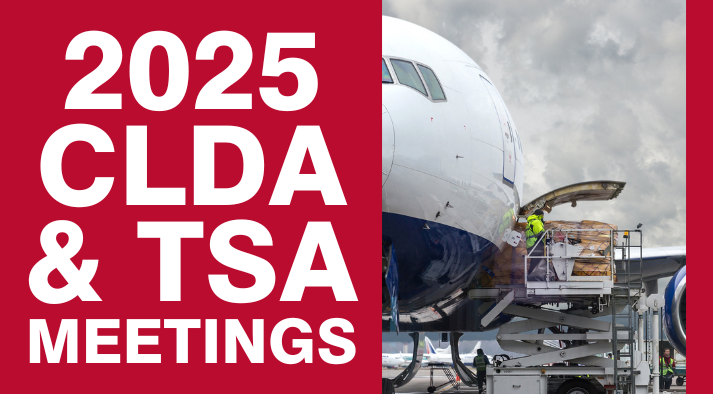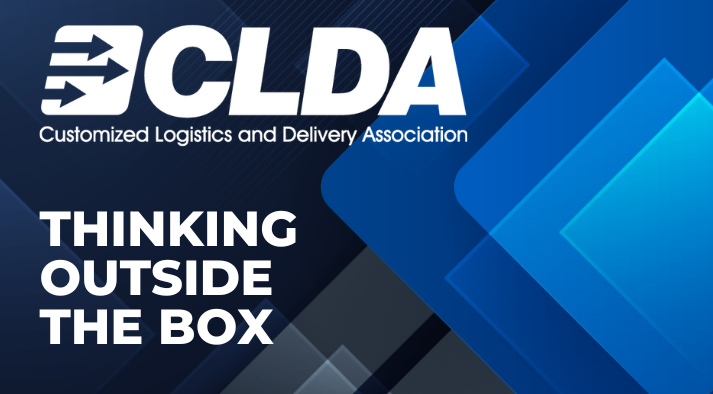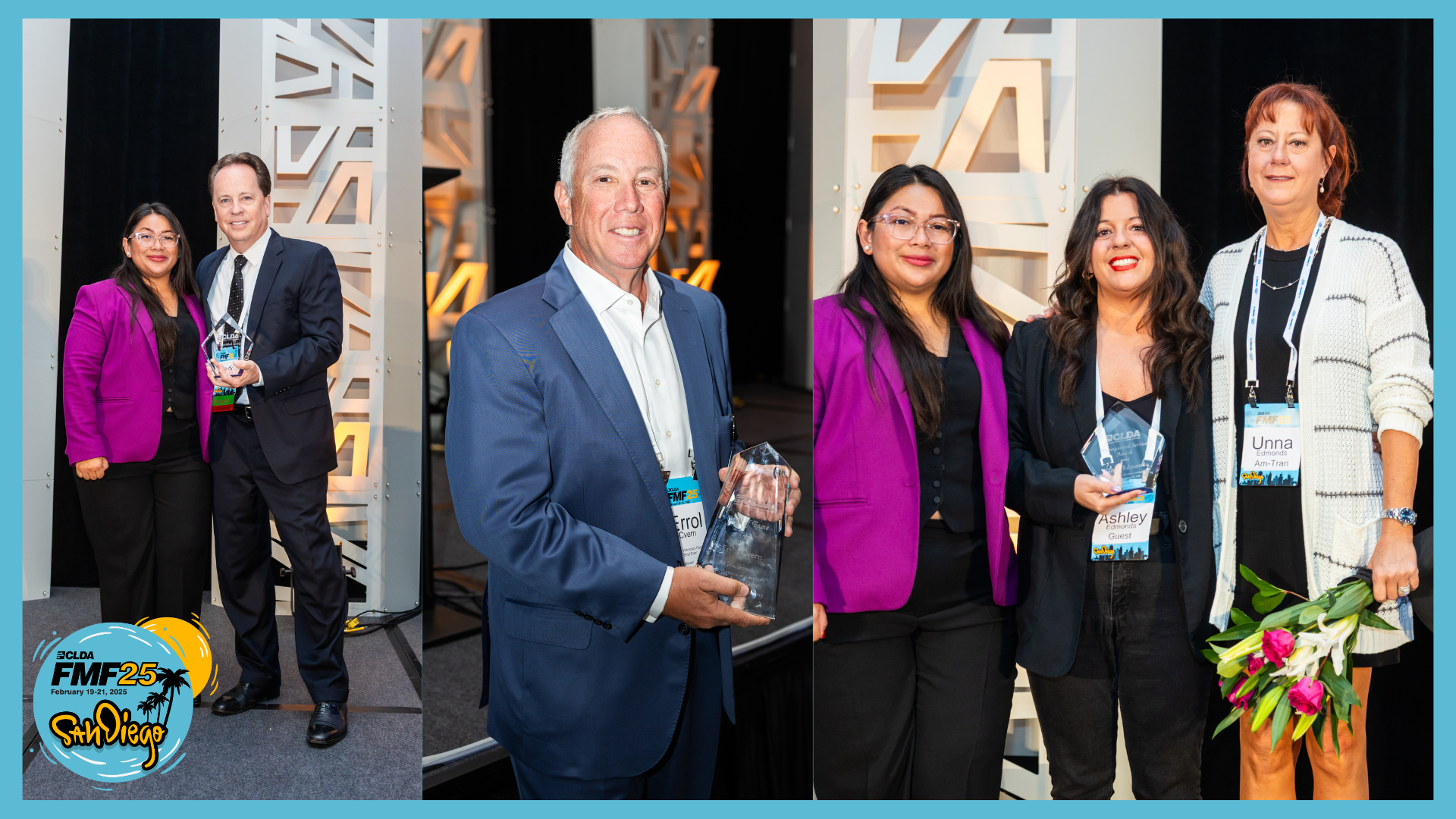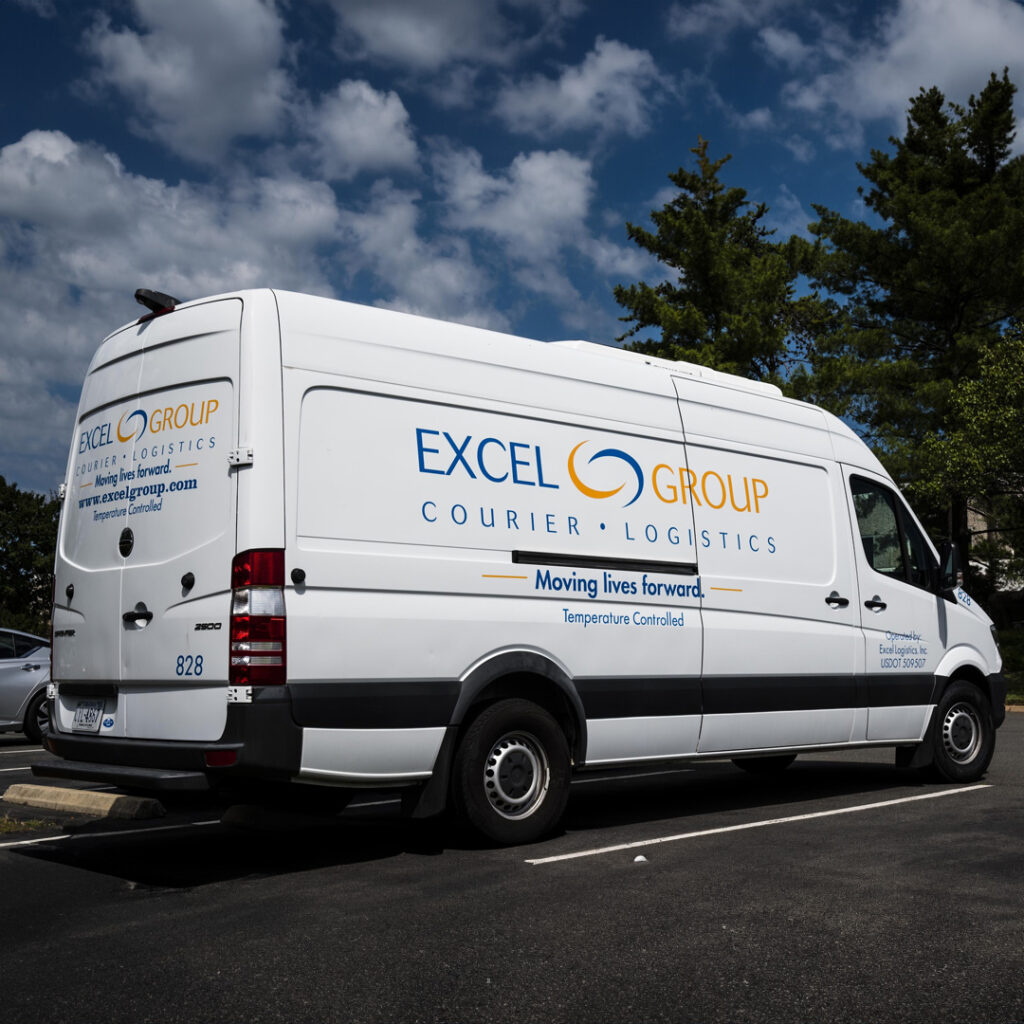
- April 5, 2025 3:57 pm·
To kick off this year’s DC Fly-In, CLDA brought together a powerful group of transportation security stakeholders for a strategic meeting at the Washington, DC offices of our advocacy partner,…
Home | News






CLDA Members are encouraged to share news about their company. CLDA may share on social media, in newsletters or on the website.

Ready to share your news with CLDA or the industry media? Learn from these tips and tricks on how to get noticed.

March 5, 2025 – Clifton, NJ – Eveready Express, a leading final-mile logistics provider, is pleased to announce the acquisition of Herman’s Delivery Service, effective March 4, 2025. This strategic move strengthens Eveready’s delivery network and expands its ability to provide seamless, technology-driven logistics solutions.
Through this acquisition, Eveready Express is enhancing its service offerings with:
Commitment to a Seamless Transition
Eveready Express is dedicated to ensuring a smooth transition for all clients:
“This acquisition represents a powerful opportunity to combine the strengths of both companies, enhancing our service capabilities while maintaining the personalized, high-quality service our clients depend on,” said Keith Kirk, President of Eveready Express. “We are committed to a seamless transition, ensuring that every client benefits from our expanded resources and expertise.”
Gary Herman, President of Herman’s Delivery Service, added: “Our clients have trusted us for over three decades, and I am confident that by joining forces with Eveready Express, we are providing them with even greater service and reliability. I will remain available to support our customers every step of the way.”
For more information about this acquisition and how it enhances service offerings, please contact:
Keith Kirk – President, Eveready Express www.evereadyexpress.com
Phone: 973-737-7013 | Email: keith@evereadylogistics.com
Gary Herman – President, Herman’s Delivery Service
Phone: 973-994-2860 | Email: gherman@hermansdelivery.com
About Eveready Express
Eveready Express is a premier final-mile logistics provider specializing in courier, trucking, and warehousing solutions. With a 98.7%+ on-time delivery record, advanced technology, and a strong customer-focused approach, Eveready Express continues to set the standard for efficiency and reliability in logistics.
About Herman’s Delivery Service
For over 33 years, Herman’s Delivery Service has been a trusted name in local delivery solutions, known for reliability, professionalism, and personalized customer service.
Media Contact:
Clarissa Botor
Eveready Express
clarissa@evereadyexpress.com
973-782-1378
What technology advances are having the most significant impact on carriers delivering the last mile? How are route optimization, real-time tracking, and AI impacting this segment of the supply chain today? And what about tomorrow?
“Thinking Outside the Box” talked to two of the industry’s thought leaders, Nitin Gupta, CEO of Beans.ai, and Arthur Axelrad, CEO and Co-Founder of Dispatch Science, for their take. Here’s what they told us.
QUESTION: How have recent advances in route optimization helped last-mile providers?
Gupta: The most significant advancement in the last decade is that the data you can put into your route optimization systems has grown exponentially. Today, you can track your drivers and your vehicles in real-time. You can also track a lot more in real-time, from exact location breadcrumbs to the temperature inside your vehicles to delivery time windows, delivery policies, and live picture proof of deliveries. That data flows into your route optimization system, helping inform better decisions. In addition to the increasing labor and fuel costs, courier companies have also become much more cognizant of what their contracts with shippers should look like.
Route optimization helps carriers adapt as the flow of deliveries changes. Planning the day for a driver has always been a tedious process. Carriers would try to optimize the routes in the morning based on what they knew. But what would happen when an extra ten deliveries came in? In the past, trying to fit them in was manual work. Today, all that is automated. It happens within a few seconds, so the driver gets on the road quicker.
These systems also allow you to add extra stops, respond if a driver is running behind, or take action if a vehicle breaks down. Today’s route optimization systems can handle all those things, which wasn’t possible five years ago. This means that these systems have made operations much more efficient.
Route optimization has also significantly impacted carriers’ ability to make the most of drivers’ time. Much of what happens in the final-mile is manual work, and the cost is very high as a result. Let’s take California as an example. The minimum wage there is $18 an hour. That’s $0.30 a minute. So, if you’re wasting a minute of a driver’s time, that impacts a carrier’s margin for that delivery. So, route optimization can be the difference between running profitably and not. Companies like Beans.ai run powerful optimization algorithms to squeeze the maximum benefit out of their day.

Nitin mentioned that there’s a ton of prep of planning and manual steps that used to bog down dispatchers and staff. That’s been drastically reduced or even eliminated by today’s systems. Route optimization is at the heart of modern cloud-based transportation management systems like ours. It’s a must-have for today’s couriers.
For courier companies, the benefits of route optimization, like Dispatch Science’s, go way past putting stops in the best sequence. It can take all of the orders and tell the carrier how many drivers they’ll need to win the day.
It can then tell when and where drivers should start and what time they should end. It can also account for specific pickup and delivery windows. If a driver breaks down or has to add a last-minute pickup, it can adjust accordingly.
It’s perpetual. It adjusts, reacts, and moves. It’s not a static one-time event. For courier companies, this means no more jumping through hoops to plan or worrying about formatting data manually. They don’t have to upload information to a third party, download it back, and inject it into their system.
Carriers no longer have to ignore the fact that the system doesn’t know about specific industry concepts like service levels, pickup and delivery windows, or parcel-specific information. Today’s systems tie all that together.
QUESTION: Talk more about real-time tracking
Axelrad: It’s all about efficiency. Nitin talked about real-time tracking. I want to build on that and discuss the impact on the last-mile. Recent advances mean that it’s about much more than just seeing the exact position of a shipment. We’re using geofencing to automatically send an alert when a driver arrives in a preset zone. This could allow a warehouse manager to know ahead of time that they need to clear the dock because the driver is about to arrive. It lets a recipient know that the driver is just minutes away or has arrived. It gives a shipper total visibility on the movement of their goods. Think about that impact on, for example, the life science delivery space. Real-time tracking could actually save lives here for those awaiting an organ transplant or life-saving medications. Knowing exactly when these deliveries will arrive has a dramatic impact.
The most critical decisions in the world are based on real-time tracking information. Recent advancements in real-time tracking have revolutionized the last-mile by allowing for unprecedented levels of transparency. And that’s what everybody’s come to expect these days. It’s not just about receiving that shipment. It’s about tracking where it’s been and knowing when it will arrive.
QUESTION: What is the impact of route optimization on pricing jobs?
Gupta: Delivery companies can use this technology to price jobs more intelligently. Better data is the key to answering RFPs or negotiating a contract with shippers. The system can consider more than just where the deliveries are going. It can consider the load size so the carrier knows how many drivers they’ll need to handle them. Our route optimization system looks at historical data and 75+ parameters to determine how many drivers are required and how much time they will spend on the road. That gives courier companies an estimate of what they can pay the drivers. Those calculations can consider fuel costs or the time and cost of charging if they use EVs. Then, the courier company can go to shippers and say, “This is my pricing based on this information.” These couriers can take the output from a model like ours and give it to the shippers, saying, “Here is the exact calculation of how we got to these numbers.” It lends transparency to the entire ecosystem, from the shipper to the carrier to the driver.
Carriers who use these systems have an advantage over their competitors.
QUESTION: Let’s talk about AI and machine learning. How do recent advances here help carriers improve their jobs?

AI can also transform a handwritten label to make it more legible or enable virtual assistants to take phone orders. AI and machine learning are already helping to improve dispatch decisions. AI can learn by using past data, including data on actual load times and delivery coordinates. That information can be corrected in the real world and used to improve plans for delivery.
Gupta: AI has become a wide field in the last three years. Traditional AI has existed for about three decades. It was called machine learning, not AI. Around 2010, it started being called AI, and now it’s called generative AI, which is one facet of AI right now.
Today’s generative AI uses machine learning systems to make the system better. Machines can run the numbers but don’t necessarily arrive at optimal outcomes. For example, the system might tell a driver to deliver in a particular order. But the driver says, “I know better. I’m not going to follow that sequence. My experience tells me there’s a better way.” We’ve been humbled when drivers are more efficient by not following the model’s suggestions. Mathematically, those models are correct, but on the ground, they may not be. Drivers have such local knowledge that they can move better. Machines don’t. A driver may know there’s a broken gate or a temporary detour because of construction. The machine doesn’t know that. Machine learning has allowed us to consider the driver’s past behaviors, combine them, and mirror what’s happening on the ground. The machine will make minor tweaks based on real-world experience to make the driver move more efficiently. It improves over time by taking into account drivers’ intuition. That’s a big part of AI today.
QUESTION: How does machine learning help with missed or incorrect deliveries?
Gupta: One of the biggest problems courier companies face is drivers dropping packages in the wrong place or in front of the wrong door. Traditional solutions have included geofencing, where the driver must be within 100 feet of the delivery location. But today, that’s not good enough.
At Beans.ai, we started with apartments. Everything is within 100 feet. So, drivers could drop things in front of the wrong door without the system being aware. We knew there had to be a better way, and machine learning helped us there. With machine learning, we can ensure that the driver puts it at the right door because it learns everything about that front door and the package. We lean heavily on the use of photos. We ask our Machine Learning models, “Do you see a package in that photo?” “Do you see the right barcode on that package?” “Do you see a door?” “Do you see a number on the door?” “Does that number match the input data?” And our model gets trained on these questions with every picture that comes in. Now, after having seen two billion plus pictures, when the driver makes a delivery, our trained model can verify whether they were at the right door.
QUESTION: What’s next for AI for those in the last-mile?
Axelrad: AI agents. Think of an agent as a layer of technology that sits on top of what’s already out there. It could sit on top of your TMS, add current weather or traffic information into the mix in real time, and automatically take action. So, when a weather event happens, that AI agent could automatically connect to the weather bureau, get that information, connect to the TMS, and redirect a load or an entire route. This is not that far off. I expect it will happen by this time next year. Companies like Dispatch Science will be starting to introduce prototypes of this.
As AI advances, carriers will do more without adding more people. The reality is that the tools that are coming will enable courier companies to maximize the use of their personnel. Some tasks will be completely automated, allowing companies to reassign their people to different functions. For example, a company may not need as many customer service reps to take telephone orders because AI will make it possible for a customer to have a conversation with a human-sounding voice. They will tell the AI agent what they want to do, and it will take that order. That will allow the staff to focus on more complex and specialized tasks. Technology will handle anything repetitive, allowing humans to do what they do best.
Gupta: Yes, I foresee these tools creating better efficiency for carriers because systems will perform more complex tasks quicker. There will likely be huge leaps, especially when it comes to route optimization and planning. Optimizations will happen quicker. The processing units already coming into use can process millions of pieces of data, looking at all the possible solutions in seconds rather than minutes. That has enormous implications for cost. It’s going to make operations way more efficient for carriers. Couriers that start using machines the right way will survive in the market. They will have to because their competitors will be using these systems, and they will be super-efficient. Carriers will be performing much better in terms of efficiency. Ultimately, their margins will be better.
We’ve seen many logistics companies close down in the last three years. This is primarily due to carriers’ inability to meet their sales goals. They’re losing contracts faster than they can get them. Those who use technology effectively will retain the contracts for much longer because their service level requirements will be higher than the clients’.
Anyone who doesn’t use the right kind of AI and load optimization cannot survive in the market. It’s like bringing a knife to a gunfight.
Axelrad: Carriers have to be prepared to make the most of AI. They need to have a compatible framework. They need to have software that is modern enough to take advantage of AI. It must be cloud-based software with APIs and the type of connectivity and interconnectivity that AI needs to be efficient.
QUESTION: How does a carrier keep up with all these changes?
One way to keep up is to avoid falling too far behind. It’s much easier to take continuous little steps than to let yourself fall too far back and then have a big wall to climb. I would use the word “iterate.” Make sure you’re checking and making technological improvements every month, every year, and moving forward. It’s like your house. If you maintain your home and do the maintenance and some renovations as you go, you won’t end up with a fossil.
It’s easier to keep up if you never get too far behind. It’s important to continuously look for the little things and the little steps that you can take to stay modern as a business. This means paying attention to what’s out there every month or every year and implementing little bits of technology as you move forward.
One of the best ways to keep up is to get involved with organizations like CLDA. That’s how you find out what’s new and get access to thought leadership in the business. It’s where companies can exchange information with colleagues and vendors. That’s how you stay current and find out how to make the best of the technological advances in our industry.
Some of the best logistics conferences might not even be on your radar but they are some of the best investments you can make in your business. Final mile logistics is a fast-growing sector, driven by e-commerce, shifting consumer demands, and technological advancements. Whether you’re a carrier, 3PL, shipper, or technology provider, attending industry-leading conferences can help you stay ahead, build valuable connections, and discover innovations shaping the future of last-mile delivery.
📍 San Diego, CA | February 19-21, 2025
🔗 Register Now
If you’re in last-mile logistics, the Final Mile Forum (FMF) is the must-attend event of the year. Hosted by the Customized Logistics and Delivery Association (CLDA), FMF is the go-to conference for an unparalleled opportunity to gain the cutting-edge tools and invaluable resources necessary for driving growth and maximizing profitability. This annual gathering of industry leaders, innovators, and experts offers a unique platform for networking, knowledge sharing, and industry education. Don’t miss your chance to be part of an event that can transform your business.
✅ Unmatched Networking – Meet decision-makers from leading final mile logistics companies.
✅ Industry Insights – Stay ahead of regulatory changes, market trends, and innovation.
✅ New Business Growth – Explore strategic partnerships and revenue opportunities.
✅ Learn What Shippers Want – Hear directly from shippers on what they want from carriers and how you can gain their business.
✅ Technology Showcase – Discover the latest in route optimization, automation, and gig economy logistics.
If you’re looking to grow your final mile business and build industry connections, FMF should be your top priority. Join CLDA for member-discounted rates!
📍 Philadelphia, PA | June 4-5, 2025
Home Delivery World focuses on the future of e-commerce logistics, final mile delivery, and urban fulfillment. This event brings together retailers, 3PLs, and technology providers to explore cost-effective, fast, and sustainable last-mile solutions.
If you’re in parcel delivery, on-demand logistics, or urban distribution, Home Delivery World is a valuable event.
📍 Las Vegas, NV | February 10-12, 2025
Manifest is one of the fastest-growing conferences in supply chain and logistics innovation. This event brings together startups, investors, logistics leaders, and technology providers to discuss the future of freight, final mile delivery, AI, automation, and sustainable logistics. As a CLDA collaboration partner, CLDA members are eligible for discounted registration.
For professionals looking to explore the future of logistics and emerging technologies, Manifest is a great event.
📍 Chicago, IL | September 8-10, 2025
PARCEL Forum is tailored for final mile and parcel logistics professionals, focusing on improving carrier relationships, cost reduction strategies, and delivery optimization. If your business deals with parcel shipping, e-commerce fulfillment, or regional logistics, this event offers critical insights.
If you’re in parcel delivery, DTC fulfillment, or e-commerce logistics, this is the event to attend.
📍 Dallas, TX | March 2-4, 2025
Final mile doesn’t just happen on the ground—air freight is a crucial component of last-mile logistics. The AirCargo Conference brings together freight forwarders, cargo airlines, 3PLs, and final mile providers to discuss strategies for seamless multimodal logistics.
If your business involves expedited logistics, time-sensitive shipments, or air-to-ground final mile delivery, this conference provides valuable insights.
If you’re in final mile logistics, these events offer high-impact networking, business growth opportunities, and cutting-edge technology showcases.
📌 Want to stay ahead in final mile logistics? Register for the Final Mile Forum today! Your next deal could be there, will you?
| Welcome to Thinking Outside the Box, a new series of posts about trends impacting those involved in the final-mile. Every month, we’ll interview one of our industry’s thought leaders to give you their insights into where the industry is now and how CLDA members can succeed today, tomorrow and in the future. |

“It’s not just about technology for the sake of technology, but technology for the sake of making life better,” Guru Rao.
This month, Thinking Outside the Box interviewed Guru Rao, CEO of nuVizz, Inc., a last-mile TMS platform company and CLDA member. Rao will also be a presenter at next month’s Final Mile Forum. Here are some excerpts from our conversation with him.
This industry is undergoing significant transformation. Here are some of the trends and challenges we see as shaping the landscape for those in the final mile.
Service providers must learn to work with various partners and operate many different types of businesses to sustain and operate profitably. Couriers must also have the flexibility to work across different verticals and for different customers.
That means that carriers must operate in co-mingled consolidated delivery scenarios. They will need to find ways to interact with many different shippers. These will be other types of businesses, each with their own requirements. You won’t be able to operate in the traditional ways of responding to demand, answering customer queries, and handling billing manually. And you will be doing more of it every day. That’s where technology comes into play. It will help you do all those things in an automated fashion so you can do more with less.

The ever-changing nature of business operations today calls for dynamic optimization. You can no longer depend on your dispatchers to react and find the right answer in today’s compressed time spans, which may be minutes or even seconds.
This is where the technology comes into play. Because it is humanly impossible for anyone to look at millions of data points to make a decision. But computers and technology are designed to be able to do that. They can handle dynamic optimization so you can operate in this new, ever-changing world of delivery without having to invest in more people. The technology takes what is more complicated and allows you to do more.
The need to be able to deliver everywhere has fueled the trend toward microfulfillment centers. Shippers that want to cover more and more zip codes are eyeing these microfulfillment centers. When a shipper wants to deliver to more people, transportation is a huge cost. Their response is to take the inventory closer to where the deliveries need to be, cutting transportation costs and increasing customer service by getting things to them faster.
AI will be a tremendous asset to those in the last-mile delivery system because they must deal with large amounts of data.
Logistics, especially in the final-mile area, operates in a real-time environment that generates millions and millions of data points. And when you have so much data, AI is the best tool to use that information and provide the right answers. We see it as a critical tool for planning, execution and post-execution analysis.
When last-mile providers are planning, you need to look at millions of data points, whether inventory planning, network optimization, opening new distribution centers or daily route optimization. Those decisions involve millions of permutations and combinations for the right answer. AI plays a huge role here because you cannot rely on humans to be able to do that.
You can do all the planning in the world, but exceptions will still happen. And in today’s delivery environment, you don’t have two days to react to those exceptions. You have minutes or even seconds. During that time, you’ve got millions of data points to figure out what to do next. What resources do you need? How can you redirect the work? How will you interact with the customer? How many people can you put in front of this problem right now? AI is a great tool, but it has one caveat: you must have the right data. Data is the most critical part of any AI conversation. As long as you have good data, the AI agent can quickly figure out and answer most of your customer queries. It can help you manage those exceptions and remove human involvement.
You’ve done planning and execution, and those steps give you reams and reams of data; that data is golden. Learn from it. AI can help you look at the patterns in the data you have generated. AI will help you figure out what the opportunity is. Are you consistently delivering late to one customer? What are the factors contributing to that? AI can look at the historical data elements and suggest a better way of planning. It will create a continuous improvement cycle, refining your business and adding efficiency every time you use it.
Couriers looking to do more with fewer people can mobilize the power of AI to create their own autonomous delivery ecosystem. Consider the alternative—the spreadsheet. If you are putting 100 things into a spreadsheet day in and day out, there’s no way a person can master all that data. On the other hand, you can easily automate that process with AI to create what we call an autonomous delivery system. Technology is very smart. As long as you track everything that is happening, it can be more efficient than one person trying to make sense of all that data.
Let’s take the example: Suppose a driver can’t deliver a product because the customer is not there. They have to mark it as “not delivered.” That typically means getting one of your dispatchers involved in watching for and reacting to that exception. In an autonomous delivery environment, the system sees that exception and creates a rule based on what needs to happen next. If this is the type of order that can be delivered the next day, it looks at the scheduled routes for tomorrow going to the same area. If not, it can find the right route to insert that into for the next day, sending a communication to both the driver and the customer with that information. All of that can happen without anybody sitting in front of their computer and watching for these exceptions.
If you’re a small company using technology appropriately, you can behave like a big company. Today’s technology enables what we call a democratization of capabilities. You don’t have to be Amazon to have the level of sophistication to provide visibility every step of the way. You don’t need to spend billions of dollars. It is readily available today with today’s technology. Today’s technology democratization allows you to do that.
If you use technology well, your service becomes more human. Technology creates the space for real interaction. Suppose you let technology handle the mundane tasks of managing millions of data points. In that case, you can use your people to add value and cultivate more relationship-based interactions with your customers, especially when context is important.
Why make your people go through spreadsheets with 100,000 lines of data? Let technology do that, and then you can use members of your team to talk to people and establish relationships. Technology can do wonders, but it cannot do simple things like looking into someone’s face to see that they are in pain. People can easily do that. So, use people in those areas and let the technology do what it is best suited to do.
It’s not just about technology for the sake of technology, but technology for the sake of making life better.
***
Want to hear more from Guru Rao? Catch his presentation, “Demystifying AI and Logistics,” at the Final Mile Forum next month. There’s still time! Register now so you don’t miss out.
Here’s a sneak peak in Guru’s own words:
***
Let us know what you think of “Thinking Outside the Box.” Let us know if you have follow-up questions, reactions, or ideas for future posts. Email us at aobston@aomc.com
CLDA urges members to oppose anti-IC policies on behalf of the industry. The policies of Lori Chavez-DeRemer, the proposed nominee for Secretary of Labor, raise concerns about her commitment to workers’ fundamental freedoms, which should give our members pause. Of particular concern is her history of restricting the use of independent contractors (ICs) while she served in Congress, Since 90% of CLDA members rely on ICs, we believe the national implementation of such policies would burden the logistics industry and the broader supply chain.
We must act now to ensure that as part of her nomination process, the Department of Labor nominee commits to the freedom to work as one chooses and to prioritize a fair, flexible labor environment.
CLDA requests all members to urge their representatives to consider the significant impact of these policies on the economy, entrepreneurship, and worker freedom. Request your representatives to strongly advocate at all hearings and every opportunity for a fair and balanced approach that prioritizes flexibility, independence, and innovation in our workforce.
Restricting Workers’ Right to Choose
With 90% of CLDA members relying on independent contractors (IC), the national implementation of such policies would place immense burdens on the logistics industry and the broader supply chain.
Rep. Chavez-DeRemer co-sponsored the Protecting the Right to Organize (PRO) Act, which sought to impose strict restrictions on IC status through a rigid ABC test. This approach mirrored California’s controversial Assembly Bill 5 (AB5). AB5 made it practically impossible to be an IC in the state, forcing many to cease operations altogether.
Research from the Mercatus Center revealed that AB5 resulted in affected sectors experiencing a staggering 10.5% decrease in California jobs. These outcomes highlight the inherent flaws in measures like the PRO Act, which limit labor options rather than expand them.
Undermining Entrepreneurial Freedom
Chavez-DeRemer’s support for federal anti-IC policies reflects a troubling trend toward centralized control over employment arrangements. The PRO Act upends over two dozen state-enacted right-to-work laws, eliminates private ballots for union voting, allows secondary boycotts, targets connected companies, codifies an unworkable joint-employer definition, and the list goes on.
“Being pro-worker means defending the rights of all workers, including those who decide it is not in their best interest to form or join a union. No American should be intimidated or coerced into joining a union,” states Senator Bill Cassidy (R-La.), chair of the Senate Health, Education, Labor, and Pensions Committee.
CLDA fully endorses Senator Cassidy’s statements and believes workers should be free to work for themselves without undue interference.
CLDA Rejects Chavez-DeRemer’s Policies
Lori Chavez-DeRemer’s support of these policies significantly threatens worker independence and economic growth. These policies erode individuals’ rights to choose self-employment or employment that benefits their lifestyle and impose unnecessary burdens on businesses and their ability to innovate.
We urge all stakeholders to contact their representatives and voice opposition to Lori Chavez-DeRemer’s position on these policies and ask for a commitment from the Department of Labor nominee to prioritize the freedom to work as one chooses and foster a fair, flexible labor environment.
Staying ahead means more than simply keeping pace with current trends—it requires a commitment to continuous learning, innovation, and adaptation. We believe that providing our members with the tools, insights, and strategies they need to succeed is the key to helping them become the most successful companies in the industry. That’s why education, and in particular Final Mile Forum education, is at the very core of the CLDA’s mission.
At the heart of this commitment is the Final Mile Forum (FMF), an annual gathering that not only connects industry professionals but also equips them with the knowledge to thrive in an ever-evolving market.
When you attend FMF, education isn’t just a passive experience—it’s a dynamic, engaging journey designed to inspire action. From thought-provoking sessions led by industry experts to roundtables tailored to solve real-world challenges, Final Mile Forum education offers a unique blend of insights that reflect the diverse needs of the final mile logistics community.
The topics covered are as varied as the challenges our members face: emerging technologies, legislative updates, operational efficiencies, and customer experience strategies. Each session is carefully curated to address the most pressing issues in the industry, ensuring attendees walk away with actionable ideas to implement in their businesses.
But FMF goes beyond the classroom-style learning. The interactive nature of FMF encourages attendees to engage in conversations, share their perspectives, and learn from each other’s experiences. Whether it’s through roundtable discussions, Q&A sessions, or informal chats during breaks, the opportunity to exchange ideas with peers and thought leaders is invaluable.
This blend of formal and informal education is what makes FMF unique. It’s not about listening to theories or hypothetical scenarios—it’s about tackling the real challenges and opportunities that final mile professionals encounter every day. The insights gained from FMF don’t just expand your understanding of the industry; they help you shape the future of your business.
The value of this education isn’t limited to one event. The knowledge gained at FMF ripples outward, influencing decisions, strategies, and innovations long after the conference ends. By attending FMF, attendees aren’t just investing in their companies; they’re investing in the collective growth of the industry itself.
Education, after all, is more than a tool for success—it’s the foundation of resilience and adaptability. In a rapidly changing landscape, it empowers businesses to anticipate challenges, seize opportunities, and lead with confidence. For CLDA members, FMF is the embodiment of this belief, offering a space to learn, grow, and excel.
So, as you consider your plans for the year ahead, remember that FMF isn’t just another industry event—it’s your gateway to industry-leading insights and strategies that can transform your business. Join us in San Diego this February, and experience firsthand how education at FMF can drive success in the final mile.
In the world of final mile logistics, relationships are the foundation of success. That’s why the Final Mile Forum (FMF) stands out as the must-attend event of the year for final mile networking opportunities. Beyond the top-tier education sessions and insights into the latest industry trends, FMF is designed to provide unmatched networking opportunities — a core benefit of CLDA membership!
Whether you’re a seasoned professional or a newcomer to the industry, FMF offers countless ways to connect, collaborate, and build lasting relationships that drive growth and open doors to new business opportunities.
Why Final Mile Networking at FMF is Critical
Networking is more than just exchanging business cards — it’s about creating meaningful connections that help you expand your reach, strengthen your business, and stay ahead in a competitive market. For CLDA members, these connections often turn into valuable partnerships and collaborations that fuel long-term success.
Ways to Network at FMF
FMF takes CLDA’s commitment to networking to the next level by combining planned and organic opportunities in a vibrant, dynamic setting.
Real Stories, Real Impact
Our members consistently tell us that the connections they make at FMF directly contribute to their growth and success. Many have secured new contracts, identified trusted partners, and even discovered game-changing solutions through the relationships forged at the event.
Make the Most of FMF
To fully leverage the networking opportunities at FMF, come prepared:
At FMF, networking isn’t just an added benefit—it’s the heart of the event. By bringing together the brightest minds and most driven professionals in the final mile logistics industry, FMF helps attendees build the relationships they need to thrive.
Don’t miss your chance to connect, collaborate, and grow. Register for FMF today and be part of the conversations that will shape the future of the industry.
1. Can you share a specific example of how your involvement with the CLDA board has positively impacted your career or business?
“I joined CLDA after serving as Vice President of the XLA (Express Logistics Association), where we represented expedited air courier companies specializing in Next Flight Out (NFO) services for life sciences, express parts, and other time-critical shipments. Joining CLDA was a natural fit, as many of our NFO shipments relied on local and regional courier companies for seamless last-mile delivery.
OTG Cargo, where I serve as President, operates as both an Indirect Air Carrier (IAC) and a trusted express ground agent for many former XLA members. The integration with CLDA has facilitated a more unified approach to logistics, fostering stronger collaboration between air couriers and ground operators that benefits everyone involved.
This merger has been incredibly rewarding, allowing us to work together on advocacy and educational efforts that enhance understanding and performance across both sectors. As a result, we can deliver a more robust logistics solution to our clients while also building a stronger, more cohesive industry community. I’m also grateful for the opportunity to represent our industry directly with the TSA, ensuring they understand our security responsibilities. Our recent TSA white paper and the accompanying industry-supported recommendations for improving air cargo security are achievements I take great pride in. Through CLDA, we’ve established a framework for collaboration that enhances security and strengthens our relationship with key regulatory bodies.”
2. What unique opportunities for networking and education has your role on the CLDA board provided, and how have these opportunities enhanced your professional development?
“My role on the CLDA board has been invaluable for my professional growth and the value I bring to our members. The strong collaborative ties that CLDA has with other associations, the TSA Cargo division, and the airfreight industry provide a unique platform for advocacy, particularly around complex compliance and security issues.
Engaging directly with the TSA and other key stakeholders allows us to influence policies that impact our industry, giving our members a voice in decisions that shape their daily operations. These partnerships foster a collaborative environment where we share best practices and develop innovative solutions that directly benefit CLDA members, from enhancing air cargo security to streamlining ground logistics for last-mile delivery.
The network I’ve developed through CLDA has deepened my understanding of the broader logistics landscape, enabling me to deliver greater value to our members and enhance their competitiveness and operational efficiency.”
3. How did you hear about CLDA, and what convinced you to join?
“I’ve been in the courier industry for over 40 years and have always recognized the valuable work done by CLDA. When the opportunity for the merger between XLA and CLDA arose, it seemed like a natural fit. Both associations had memberships that were very familiar with one another, each bringing unique strengths to the table.
XLA represented expedited air couriers, while CLDA had a robust network of ground logistics providers. This merger created a well-rounded association capable of serving the full spectrum of logistics needs. It was this synergy that convinced me to join CLDA, and I’ve been grateful for the opportunities it has provided to enhance industry collaboration and better serve our members.”
The CLDA Final Mile Forum (FMF), the premier event for the final mile logistics industry, is more than a conference—it’s your gateway to connecting with key decision-makers, building meaningful relationships, and growing your business. For companies looking to showcase their offerings, the event is the ultimate opportunity to gain valuable face time with potential customers and strengthen ties with existing clients, all in one convenient location.
Why CLDA Final Mile Forum Exhibits and Sponsors?
Connect with Decision-Makers in One Place
FMF attracts a highly targeted audience, including business owners, executives, and logistics professionals. By exhibiting or sponsoring, you gain unparalleled access to the individuals who make purchasing decisions for their organizations. Skip the cold calls and emails—this is where meaningful conversations happen.
Showcase Your Expertise
Position your company as an industry leader by presenting your products, services, or solutions directly to the people who need them. Exhibiting provides a hands-on way to demonstrate how your offerings can help attendees overcome their biggest challenges in the final mile.
Unmatched Networking Opportunities
From structured networking events to informal conversations, FMF offers countless ways to connect with attendees. Exhibitors and sponsors benefit from direct exposure to an audience eager to learn, collaborate, and do business. Build relationships that extend far beyond the event.
Increase Your Brand Visibility
Sponsoring FMF puts your brand front and center, with opportunities for logo placement, on-site visibility, and recognition in event materials. Whether through a prominent exhibit booth or a tailored sponsorship package, your company will stand out among industry leaders.
Gain Insight into Industry Trends
Being part of FMF isn’t just about showcasing your solutions—it’s also an opportunity to gain a deeper understanding of the challenges and trends shaping the final mile industry. Engage in conversations, attend sessions, and learn how to align your offerings with market demands.
Cost-Effective Marketing ROI
Compared to traditional marketing and sales tactics, exhibiting or sponsoring offers a concentrated ROI. With hundreds of attendees representing companies across the industry, you’ll maximize your exposure to potential leads and partners in just a few days.
Don’t Miss Out—Secure Your Final Mile Forum Exhibits and Sponsors Spot Today!
FMF is your chance to make meaningful connections, grow your business, and demonstrate your industry leadership. Don’t wait—exhibit spaces and sponsorship opportunities are limited and fill up fast.
Explore available packages and reserve your spot at FMF. We can’t wait to see you there!
There’s no substitute for face-to-face interactions, and FMF delivers them in spades. Whether you’re looking to launch a new product, connect with decision-makers, or amplify your brand presence, exhibiting or sponsoring at FMF is an investment in your business’s growth and success.
1. Can you share a specific example of how your involvement with the CLDA board has positively impacted your career or business?
As a result of in depth business strategy discussions with CLDA board members, Priority Courier Experts is now immeasurably safer in all our business practices. These improvements have protected PCE from many legal challenges and has safely preserved our business labor model. This involvement has also helped us expand into CDL trucking to significantly improve our business.
2. How did you hear about CLDA, and what convinced you to join?
I realized that even a strong mid-sized business is not big enough to stand up against all the legal and regulatory challenges that are regularly arising that are mission critical harmful to our industry. It is only by banding together that we have a chance to protect our businesses and continually improve them. The willingness of CLDA member companies to help is each other in both business strategy/operations and Government Advocacy cannot be found in any other industry Association or group.